MGMT 20134: Business Ethics - Bribery, Corruption, and Culture
VerifiedAdded on 2023/06/08
|10
|2902
|232
Essay
AI Summary
This essay examines the complex issues of bribery and corruption in international business, particularly in developing countries. It delves into the ethical dimensions of these practices, analyzing them through the lenses of ethical relativism, consequentialism, deontology, and virtue ethics. The essay contrasts different legal approaches to bribery, comparing Australian legislation with that of another country. A case study related to Larsen and Turbo in India is analyzed through ethical theories. The essay concludes that ethical business practices are good business practices, despite the cultural and political differences across the globe. It emphasizes the importance of ethical decision-making for managers and organizations to ensure legal compliance, maintain a good reputation, and achieve long-term sustainability. Desklib provides access to similar assignments and study resources for students.
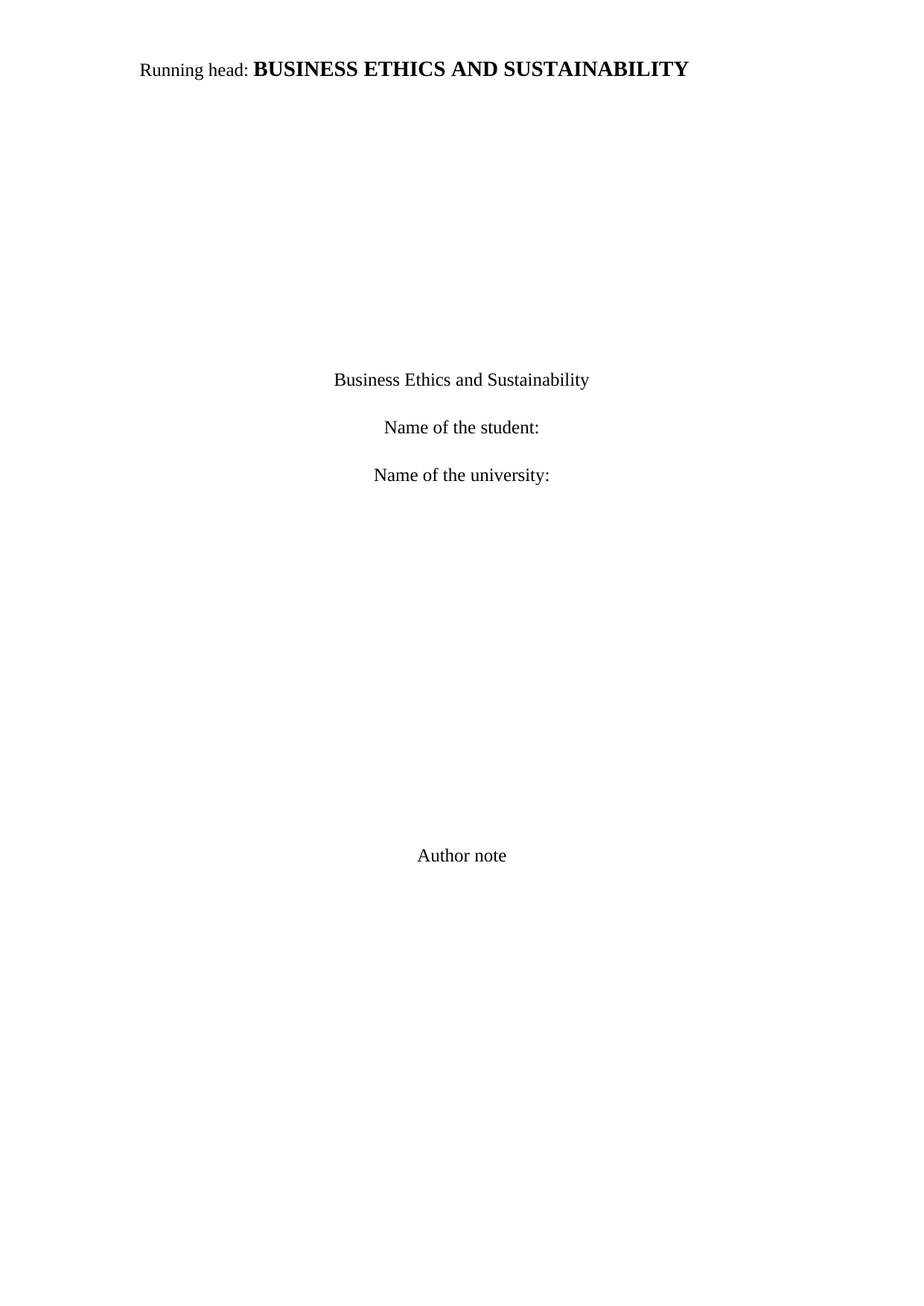
Running head: BUSINESS ETHICS AND SUSTAINABILITY
Business Ethics and Sustainability
Name of the student:
Name of the university:
Author note
Business Ethics and Sustainability
Name of the student:
Name of the university:
Author note
Paraphrase This Document
Need a fresh take? Get an instant paraphrase of this document with our AI Paraphraser
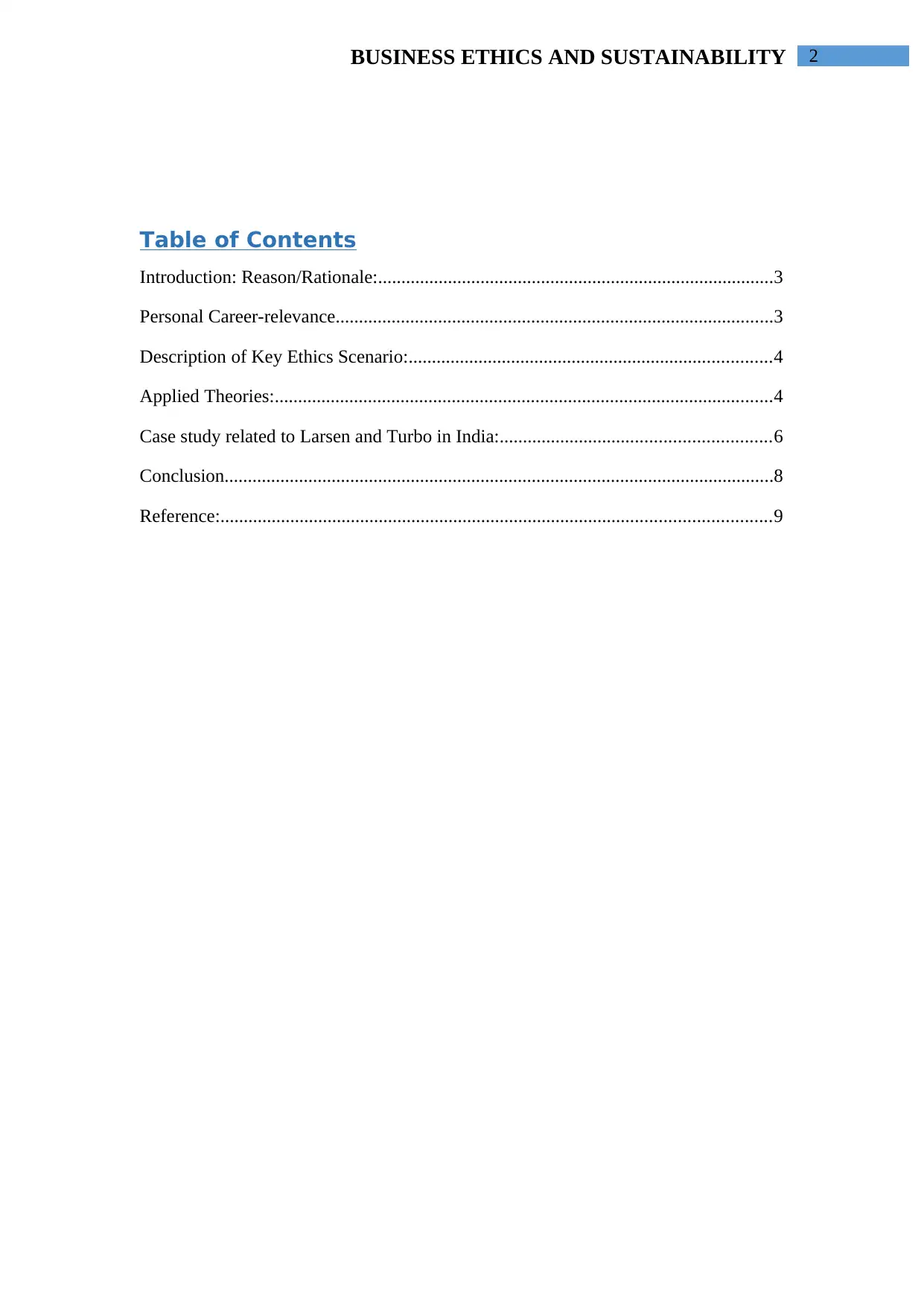
2BUSINESS ETHICS AND SUSTAINABILITY
Table of Contents
Introduction: Reason/Rationale:.....................................................................................3
Personal Career-relevance..............................................................................................3
Description of Key Ethics Scenario:..............................................................................4
Applied Theories:...........................................................................................................4
Case study related to Larsen and Turbo in India:..........................................................6
Conclusion......................................................................................................................8
Reference:......................................................................................................................9
Table of Contents
Introduction: Reason/Rationale:.....................................................................................3
Personal Career-relevance..............................................................................................3
Description of Key Ethics Scenario:..............................................................................4
Applied Theories:...........................................................................................................4
Case study related to Larsen and Turbo in India:..........................................................6
Conclusion......................................................................................................................8
Reference:......................................................................................................................9
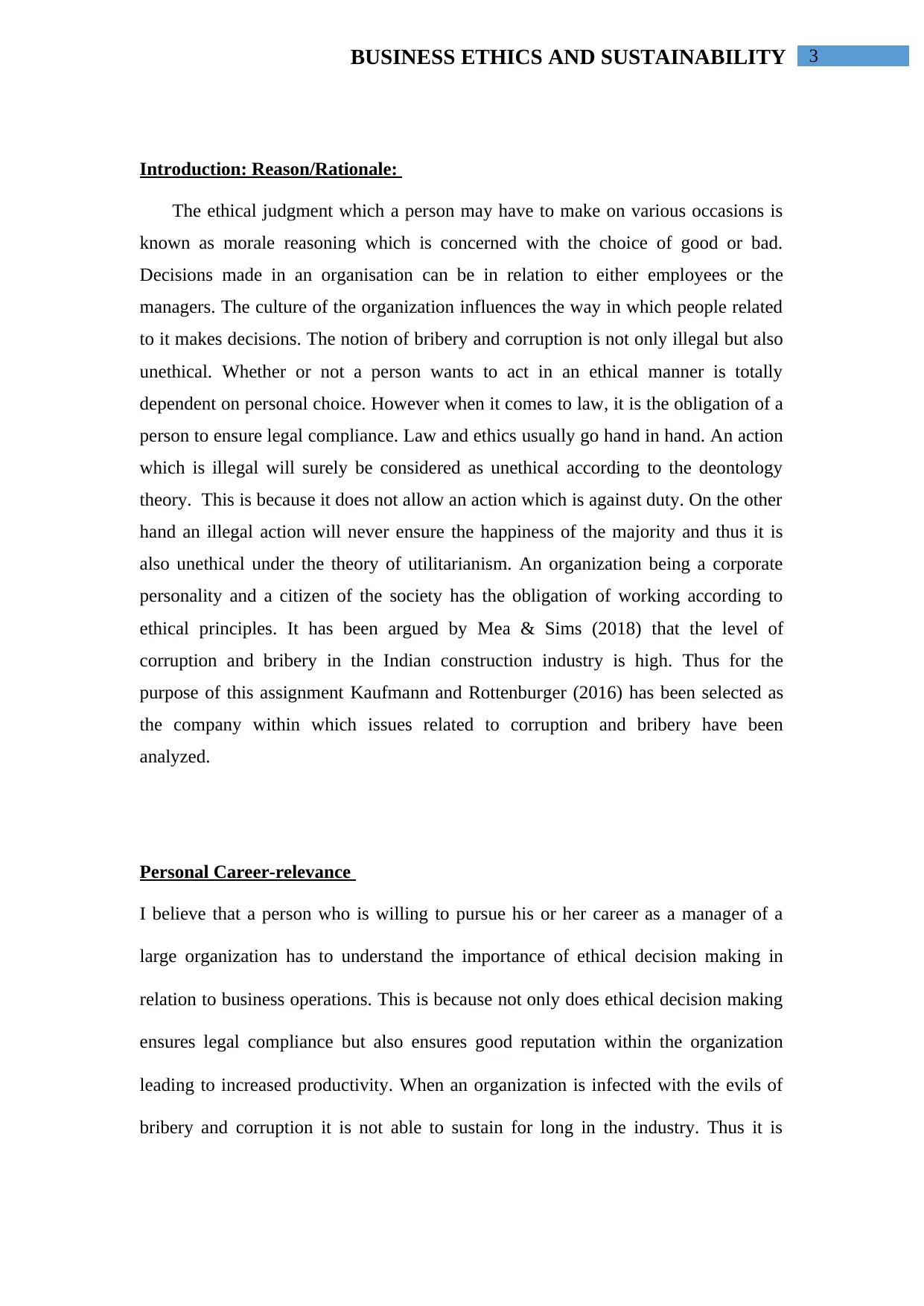
3BUSINESS ETHICS AND SUSTAINABILITY
Introduction: Reason/Rationale:
The ethical judgment which a person may have to make on various occasions is
known as morale reasoning which is concerned with the choice of good or bad.
Decisions made in an organisation can be in relation to either employees or the
managers. The culture of the organization influences the way in which people related
to it makes decisions. The notion of bribery and corruption is not only illegal but also
unethical. Whether or not a person wants to act in an ethical manner is totally
dependent on personal choice. However when it comes to law, it is the obligation of a
person to ensure legal compliance. Law and ethics usually go hand in hand. An action
which is illegal will surely be considered as unethical according to the deontology
theory. This is because it does not allow an action which is against duty. On the other
hand an illegal action will never ensure the happiness of the majority and thus it is
also unethical under the theory of utilitarianism. An organization being a corporate
personality and a citizen of the society has the obligation of working according to
ethical principles. It has been argued by Mea & Sims (2018) that the level of
corruption and bribery in the Indian construction industry is high. Thus for the
purpose of this assignment Kaufmann and Rottenburger (2016) has been selected as
the company within which issues related to corruption and bribery have been
analyzed.
Personal Career-relevance
I believe that a person who is willing to pursue his or her career as a manager of a
large organization has to understand the importance of ethical decision making in
relation to business operations. This is because not only does ethical decision making
ensures legal compliance but also ensures good reputation within the organization
leading to increased productivity. When an organization is infected with the evils of
bribery and corruption it is not able to sustain for long in the industry. Thus it is
Introduction: Reason/Rationale:
The ethical judgment which a person may have to make on various occasions is
known as morale reasoning which is concerned with the choice of good or bad.
Decisions made in an organisation can be in relation to either employees or the
managers. The culture of the organization influences the way in which people related
to it makes decisions. The notion of bribery and corruption is not only illegal but also
unethical. Whether or not a person wants to act in an ethical manner is totally
dependent on personal choice. However when it comes to law, it is the obligation of a
person to ensure legal compliance. Law and ethics usually go hand in hand. An action
which is illegal will surely be considered as unethical according to the deontology
theory. This is because it does not allow an action which is against duty. On the other
hand an illegal action will never ensure the happiness of the majority and thus it is
also unethical under the theory of utilitarianism. An organization being a corporate
personality and a citizen of the society has the obligation of working according to
ethical principles. It has been argued by Mea & Sims (2018) that the level of
corruption and bribery in the Indian construction industry is high. Thus for the
purpose of this assignment Kaufmann and Rottenburger (2016) has been selected as
the company within which issues related to corruption and bribery have been
analyzed.
Personal Career-relevance
I believe that a person who is willing to pursue his or her career as a manager of a
large organization has to understand the importance of ethical decision making in
relation to business operations. This is because not only does ethical decision making
ensures legal compliance but also ensures good reputation within the organization
leading to increased productivity. When an organization is infected with the evils of
bribery and corruption it is not able to sustain for long in the industry. Thus it is
⊘ This is a preview!⊘
Do you want full access?
Subscribe today to unlock all pages.

Trusted by 1+ million students worldwide
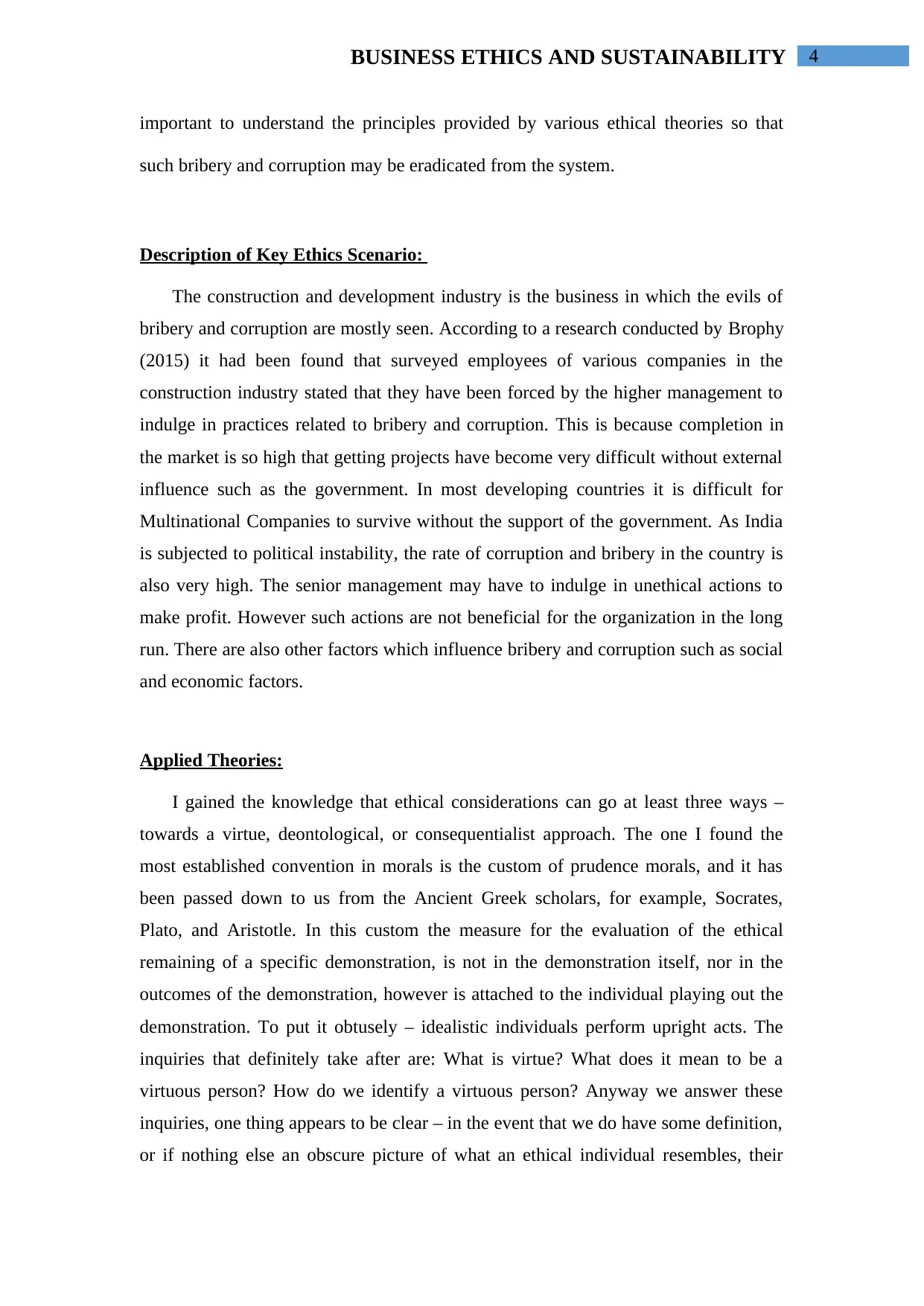
4BUSINESS ETHICS AND SUSTAINABILITY
important to understand the principles provided by various ethical theories so that
such bribery and corruption may be eradicated from the system.
Description of Key Ethics Scenario:
The construction and development industry is the business in which the evils of
bribery and corruption are mostly seen. According to a research conducted by Brophy
(2015) it had been found that surveyed employees of various companies in the
construction industry stated that they have been forced by the higher management to
indulge in practices related to bribery and corruption. This is because completion in
the market is so high that getting projects have become very difficult without external
influence such as the government. In most developing countries it is difficult for
Multinational Companies to survive without the support of the government. As India
is subjected to political instability, the rate of corruption and bribery in the country is
also very high. The senior management may have to indulge in unethical actions to
make profit. However such actions are not beneficial for the organization in the long
run. There are also other factors which influence bribery and corruption such as social
and economic factors.
Applied Theories:
I gained the knowledge that ethical considerations can go at least three ways –
towards a virtue, deontological, or consequentialist approach. The one I found the
most established convention in morals is the custom of prudence morals, and it has
been passed down to us from the Ancient Greek scholars, for example, Socrates,
Plato, and Aristotle. In this custom the measure for the evaluation of the ethical
remaining of a specific demonstration, is not in the demonstration itself, nor in the
outcomes of the demonstration, however is attached to the individual playing out the
demonstration. To put it obtusely – idealistic individuals perform upright acts. The
inquiries that definitely take after are: What is virtue? What does it mean to be a
virtuous person? How do we identify a virtuous person? Anyway we answer these
inquiries, one thing appears to be clear – in the event that we do have some definition,
or if nothing else an obscure picture of what an ethical individual resembles, their
important to understand the principles provided by various ethical theories so that
such bribery and corruption may be eradicated from the system.
Description of Key Ethics Scenario:
The construction and development industry is the business in which the evils of
bribery and corruption are mostly seen. According to a research conducted by Brophy
(2015) it had been found that surveyed employees of various companies in the
construction industry stated that they have been forced by the higher management to
indulge in practices related to bribery and corruption. This is because completion in
the market is so high that getting projects have become very difficult without external
influence such as the government. In most developing countries it is difficult for
Multinational Companies to survive without the support of the government. As India
is subjected to political instability, the rate of corruption and bribery in the country is
also very high. The senior management may have to indulge in unethical actions to
make profit. However such actions are not beneficial for the organization in the long
run. There are also other factors which influence bribery and corruption such as social
and economic factors.
Applied Theories:
I gained the knowledge that ethical considerations can go at least three ways –
towards a virtue, deontological, or consequentialist approach. The one I found the
most established convention in morals is the custom of prudence morals, and it has
been passed down to us from the Ancient Greek scholars, for example, Socrates,
Plato, and Aristotle. In this custom the measure for the evaluation of the ethical
remaining of a specific demonstration, is not in the demonstration itself, nor in the
outcomes of the demonstration, however is attached to the individual playing out the
demonstration. To put it obtusely – idealistic individuals perform upright acts. The
inquiries that definitely take after are: What is virtue? What does it mean to be a
virtuous person? How do we identify a virtuous person? Anyway we answer these
inquiries, one thing appears to be clear – in the event that we do have some definition,
or if nothing else an obscure picture of what an ethical individual resembles, their
Paraphrase This Document
Need a fresh take? Get an instant paraphrase of this document with our AI Paraphraser
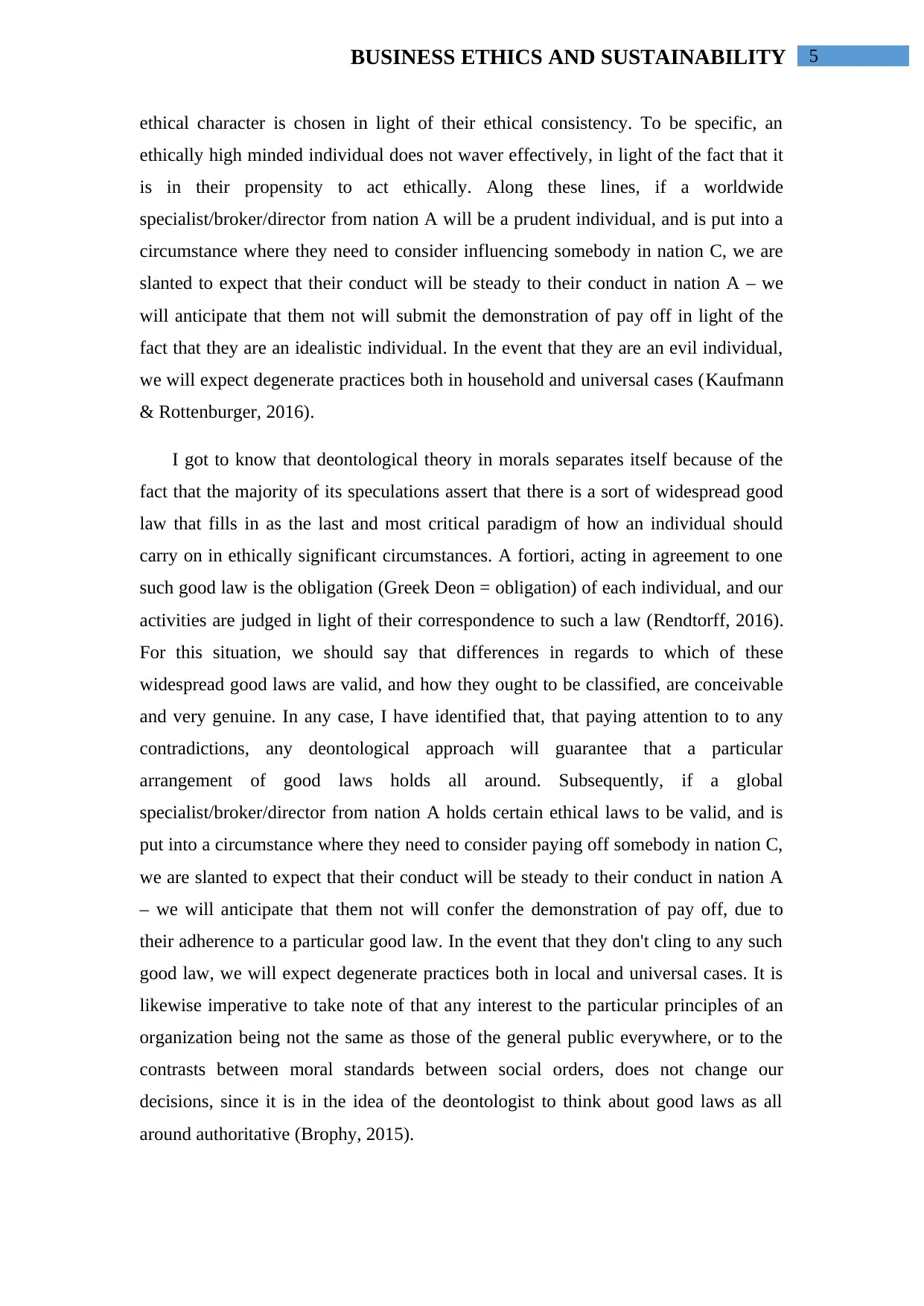
5BUSINESS ETHICS AND SUSTAINABILITY
ethical character is chosen in light of their ethical consistency. To be specific, an
ethically high minded individual does not waver effectively, in light of the fact that it
is in their propensity to act ethically. Along these lines, if a worldwide
specialist/broker/director from nation A will be a prudent individual, and is put into a
circumstance where they need to consider influencing somebody in nation C, we are
slanted to expect that their conduct will be steady to their conduct in nation A – we
will anticipate that them not will submit the demonstration of pay off in light of the
fact that they are an idealistic individual. In the event that they are an evil individual,
we will expect degenerate practices both in household and universal cases (Kaufmann
& Rottenburger, 2016).
I got to know that deontological theory in morals separates itself because of the
fact that the majority of its speculations assert that there is a sort of widespread good
law that fills in as the last and most critical paradigm of how an individual should
carry on in ethically significant circumstances. A fortiori, acting in agreement to one
such good law is the obligation (Greek Deon = obligation) of each individual, and our
activities are judged in light of their correspondence to such a law (Rendtorff, 2016).
For this situation, we should say that differences in regards to which of these
widespread good laws are valid, and how they ought to be classified, are conceivable
and very genuine. In any case, I have identified that, that paying attention to to any
contradictions, any deontological approach will guarantee that a particular
arrangement of good laws holds all around. Subsequently, if a global
specialist/broker/director from nation A holds certain ethical laws to be valid, and is
put into a circumstance where they need to consider paying off somebody in nation C,
we are slanted to expect that their conduct will be steady to their conduct in nation A
– we will anticipate that them not will confer the demonstration of pay off, due to
their adherence to a particular good law. In the event that they don't cling to any such
good law, we will expect degenerate practices both in local and universal cases. It is
likewise imperative to take note of that any interest to the particular principles of an
organization being not the same as those of the general public everywhere, or to the
contrasts between moral standards between social orders, does not change our
decisions, since it is in the idea of the deontologist to think about good laws as all
around authoritative (Brophy, 2015).
ethical character is chosen in light of their ethical consistency. To be specific, an
ethically high minded individual does not waver effectively, in light of the fact that it
is in their propensity to act ethically. Along these lines, if a worldwide
specialist/broker/director from nation A will be a prudent individual, and is put into a
circumstance where they need to consider influencing somebody in nation C, we are
slanted to expect that their conduct will be steady to their conduct in nation A – we
will anticipate that them not will submit the demonstration of pay off in light of the
fact that they are an idealistic individual. In the event that they are an evil individual,
we will expect degenerate practices both in household and universal cases (Kaufmann
& Rottenburger, 2016).
I got to know that deontological theory in morals separates itself because of the
fact that the majority of its speculations assert that there is a sort of widespread good
law that fills in as the last and most critical paradigm of how an individual should
carry on in ethically significant circumstances. A fortiori, acting in agreement to one
such good law is the obligation (Greek Deon = obligation) of each individual, and our
activities are judged in light of their correspondence to such a law (Rendtorff, 2016).
For this situation, we should say that differences in regards to which of these
widespread good laws are valid, and how they ought to be classified, are conceivable
and very genuine. In any case, I have identified that, that paying attention to to any
contradictions, any deontological approach will guarantee that a particular
arrangement of good laws holds all around. Subsequently, if a global
specialist/broker/director from nation A holds certain ethical laws to be valid, and is
put into a circumstance where they need to consider paying off somebody in nation C,
we are slanted to expect that their conduct will be steady to their conduct in nation A
– we will anticipate that them not will confer the demonstration of pay off, due to
their adherence to a particular good law. In the event that they don't cling to any such
good law, we will expect degenerate practices both in local and universal cases. It is
likewise imperative to take note of that any interest to the particular principles of an
organization being not the same as those of the general public everywhere, or to the
contrasts between moral standards between social orders, does not change our
decisions, since it is in the idea of the deontologist to think about good laws as all
around authoritative (Brophy, 2015).
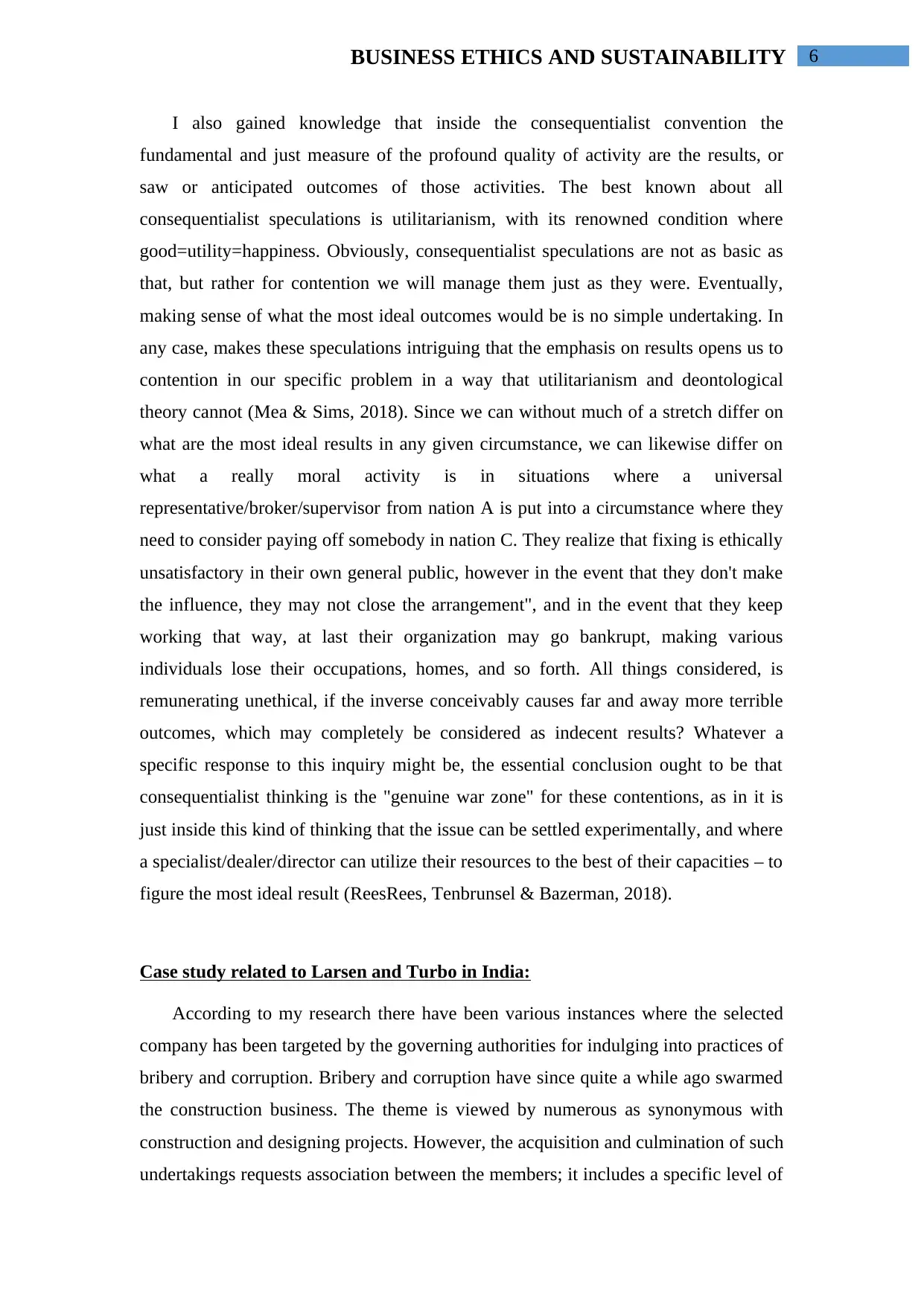
6BUSINESS ETHICS AND SUSTAINABILITY
I also gained knowledge that inside the consequentialist convention the
fundamental and just measure of the profound quality of activity are the results, or
saw or anticipated outcomes of those activities. The best known about all
consequentialist speculations is utilitarianism, with its renowned condition where
good=utility=happiness. Obviously, consequentialist speculations are not as basic as
that, but rather for contention we will manage them just as they were. Eventually,
making sense of what the most ideal outcomes would be is no simple undertaking. In
any case, makes these speculations intriguing that the emphasis on results opens us to
contention in our specific problem in a way that utilitarianism and deontological
theory cannot (Mea & Sims, 2018). Since we can without much of a stretch differ on
what are the most ideal results in any given circumstance, we can likewise differ on
what a really moral activity is in situations where a universal
representative/broker/supervisor from nation A is put into a circumstance where they
need to consider paying off somebody in nation C. They realize that fixing is ethically
unsatisfactory in their own general public, however in the event that they don't make
the influence, they may not close the arrangement", and in the event that they keep
working that way, at last their organization may go bankrupt, making various
individuals lose their occupations, homes, and so forth. All things considered, is
remunerating unethical, if the inverse conceivably causes far and away more terrible
outcomes, which may completely be considered as indecent results? Whatever a
specific response to this inquiry might be, the essential conclusion ought to be that
consequentialist thinking is the "genuine war zone" for these contentions, as in it is
just inside this kind of thinking that the issue can be settled experimentally, and where
a specialist/dealer/director can utilize their resources to the best of their capacities – to
figure the most ideal result (ReesRees, Tenbrunsel & Bazerman, 2018).
Case study related to Larsen and Turbo in India:
According to my research there have been various instances where the selected
company has been targeted by the governing authorities for indulging into practices of
bribery and corruption. Bribery and corruption have since quite a while ago swarmed
the construction business. The theme is viewed by numerous as synonymous with
construction and designing projects. However, the acquisition and culmination of such
undertakings requests association between the members; it includes a specific level of
I also gained knowledge that inside the consequentialist convention the
fundamental and just measure of the profound quality of activity are the results, or
saw or anticipated outcomes of those activities. The best known about all
consequentialist speculations is utilitarianism, with its renowned condition where
good=utility=happiness. Obviously, consequentialist speculations are not as basic as
that, but rather for contention we will manage them just as they were. Eventually,
making sense of what the most ideal outcomes would be is no simple undertaking. In
any case, makes these speculations intriguing that the emphasis on results opens us to
contention in our specific problem in a way that utilitarianism and deontological
theory cannot (Mea & Sims, 2018). Since we can without much of a stretch differ on
what are the most ideal results in any given circumstance, we can likewise differ on
what a really moral activity is in situations where a universal
representative/broker/supervisor from nation A is put into a circumstance where they
need to consider paying off somebody in nation C. They realize that fixing is ethically
unsatisfactory in their own general public, however in the event that they don't make
the influence, they may not close the arrangement", and in the event that they keep
working that way, at last their organization may go bankrupt, making various
individuals lose their occupations, homes, and so forth. All things considered, is
remunerating unethical, if the inverse conceivably causes far and away more terrible
outcomes, which may completely be considered as indecent results? Whatever a
specific response to this inquiry might be, the essential conclusion ought to be that
consequentialist thinking is the "genuine war zone" for these contentions, as in it is
just inside this kind of thinking that the issue can be settled experimentally, and where
a specialist/dealer/director can utilize their resources to the best of their capacities – to
figure the most ideal result (ReesRees, Tenbrunsel & Bazerman, 2018).
Case study related to Larsen and Turbo in India:
According to my research there have been various instances where the selected
company has been targeted by the governing authorities for indulging into practices of
bribery and corruption. Bribery and corruption have since quite a while ago swarmed
the construction business. The theme is viewed by numerous as synonymous with
construction and designing projects. However, the acquisition and culmination of such
undertakings requests association between the members; it includes a specific level of
⊘ This is a preview!⊘
Do you want full access?
Subscribe today to unlock all pages.

Trusted by 1+ million students worldwide
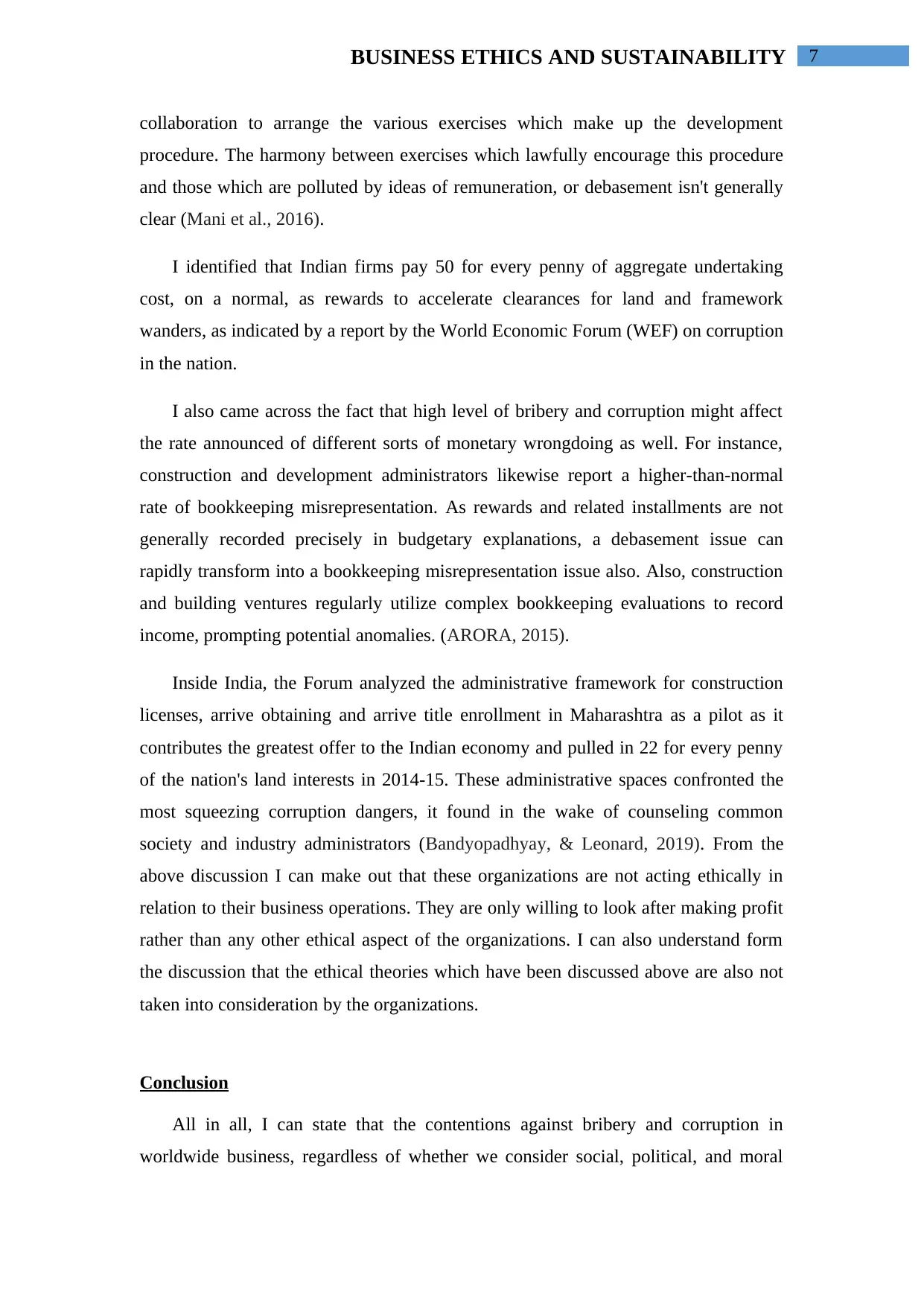
7BUSINESS ETHICS AND SUSTAINABILITY
collaboration to arrange the various exercises which make up the development
procedure. The harmony between exercises which lawfully encourage this procedure
and those which are polluted by ideas of remuneration, or debasement isn't generally
clear (Mani et al., 2016).
I identified that Indian firms pay 50 for every penny of aggregate undertaking
cost, on a normal, as rewards to accelerate clearances for land and framework
wanders, as indicated by a report by the World Economic Forum (WEF) on corruption
in the nation.
I also came across the fact that high level of bribery and corruption might affect
the rate announced of different sorts of monetary wrongdoing as well. For instance,
construction and development administrators likewise report a higher-than-normal
rate of bookkeeping misrepresentation. As rewards and related installments are not
generally recorded precisely in budgetary explanations, a debasement issue can
rapidly transform into a bookkeeping misrepresentation issue also. Also, construction
and building ventures regularly utilize complex bookkeeping evaluations to record
income, prompting potential anomalies. (ARORA, 2015).
Inside India, the Forum analyzed the administrative framework for construction
licenses, arrive obtaining and arrive title enrollment in Maharashtra as a pilot as it
contributes the greatest offer to the Indian economy and pulled in 22 for every penny
of the nation's land interests in 2014-15. These administrative spaces confronted the
most squeezing corruption dangers, it found in the wake of counseling common
society and industry administrators (Bandyopadhyay, & Leonard, 2019). From the
above discussion I can make out that these organizations are not acting ethically in
relation to their business operations. They are only willing to look after making profit
rather than any other ethical aspect of the organizations. I can also understand form
the discussion that the ethical theories which have been discussed above are also not
taken into consideration by the organizations.
Conclusion
All in all, I can state that the contentions against bribery and corruption in
worldwide business, regardless of whether we consider social, political, and moral
collaboration to arrange the various exercises which make up the development
procedure. The harmony between exercises which lawfully encourage this procedure
and those which are polluted by ideas of remuneration, or debasement isn't generally
clear (Mani et al., 2016).
I identified that Indian firms pay 50 for every penny of aggregate undertaking
cost, on a normal, as rewards to accelerate clearances for land and framework
wanders, as indicated by a report by the World Economic Forum (WEF) on corruption
in the nation.
I also came across the fact that high level of bribery and corruption might affect
the rate announced of different sorts of monetary wrongdoing as well. For instance,
construction and development administrators likewise report a higher-than-normal
rate of bookkeeping misrepresentation. As rewards and related installments are not
generally recorded precisely in budgetary explanations, a debasement issue can
rapidly transform into a bookkeeping misrepresentation issue also. Also, construction
and building ventures regularly utilize complex bookkeeping evaluations to record
income, prompting potential anomalies. (ARORA, 2015).
Inside India, the Forum analyzed the administrative framework for construction
licenses, arrive obtaining and arrive title enrollment in Maharashtra as a pilot as it
contributes the greatest offer to the Indian economy and pulled in 22 for every penny
of the nation's land interests in 2014-15. These administrative spaces confronted the
most squeezing corruption dangers, it found in the wake of counseling common
society and industry administrators (Bandyopadhyay, & Leonard, 2019). From the
above discussion I can make out that these organizations are not acting ethically in
relation to their business operations. They are only willing to look after making profit
rather than any other ethical aspect of the organizations. I can also understand form
the discussion that the ethical theories which have been discussed above are also not
taken into consideration by the organizations.
Conclusion
All in all, I can state that the contentions against bribery and corruption in
worldwide business, regardless of whether we consider social, political, and moral
Paraphrase This Document
Need a fresh take? Get an instant paraphrase of this document with our AI Paraphraser
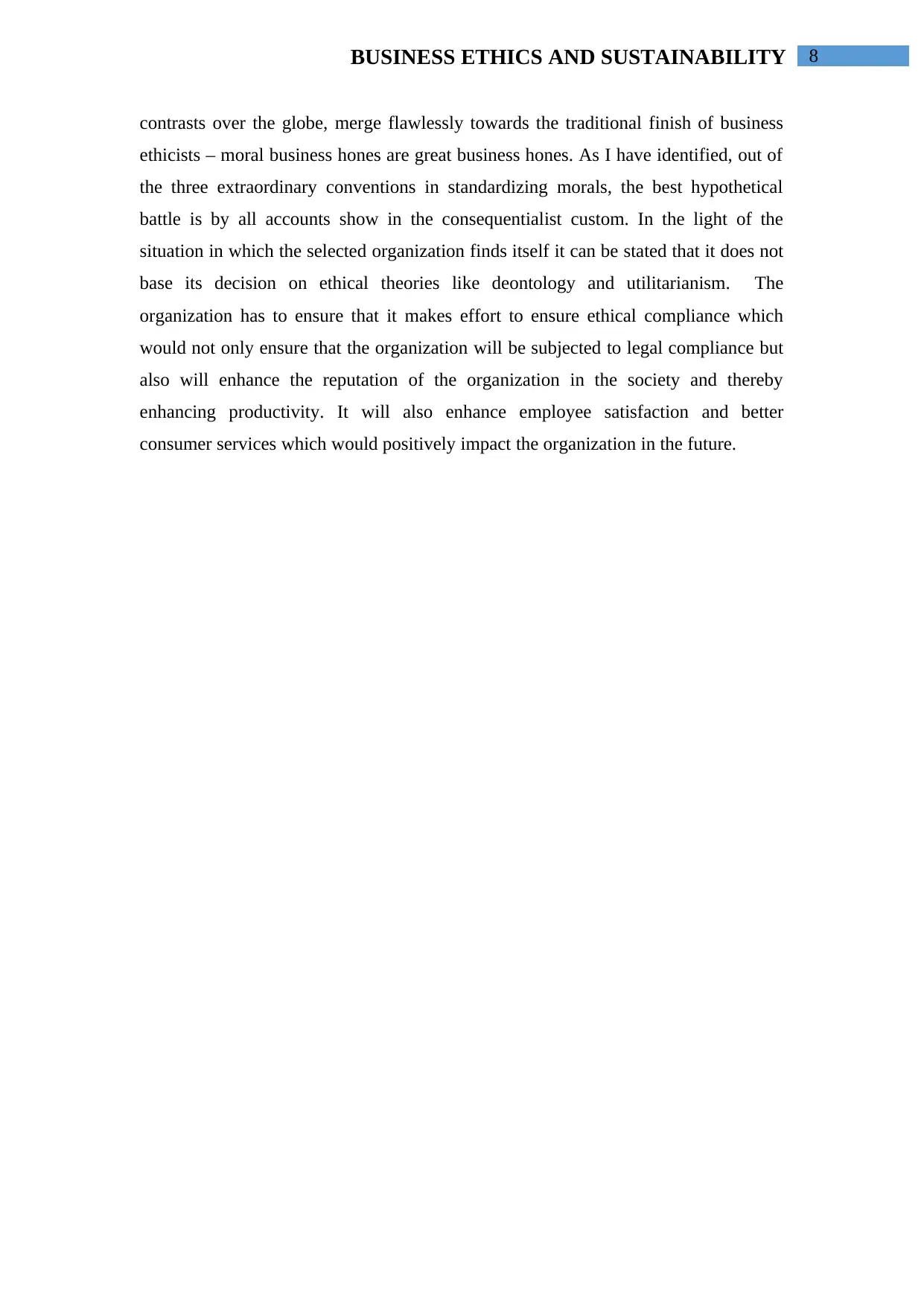
8BUSINESS ETHICS AND SUSTAINABILITY
contrasts over the globe, merge flawlessly towards the traditional finish of business
ethicists – moral business hones are great business hones. As I have identified, out of
the three extraordinary conventions in standardizing morals, the best hypothetical
battle is by all accounts show in the consequentialist custom. In the light of the
situation in which the selected organization finds itself it can be stated that it does not
base its decision on ethical theories like deontology and utilitarianism. The
organization has to ensure that it makes effort to ensure ethical compliance which
would not only ensure that the organization will be subjected to legal compliance but
also will enhance the reputation of the organization in the society and thereby
enhancing productivity. It will also enhance employee satisfaction and better
consumer services which would positively impact the organization in the future.
contrasts over the globe, merge flawlessly towards the traditional finish of business
ethicists – moral business hones are great business hones. As I have identified, out of
the three extraordinary conventions in standardizing morals, the best hypothetical
battle is by all accounts show in the consequentialist custom. In the light of the
situation in which the selected organization finds itself it can be stated that it does not
base its decision on ethical theories like deontology and utilitarianism. The
organization has to ensure that it makes effort to ensure ethical compliance which
would not only ensure that the organization will be subjected to legal compliance but
also will enhance the reputation of the organization in the society and thereby
enhancing productivity. It will also enhance employee satisfaction and better
consumer services which would positively impact the organization in the future.
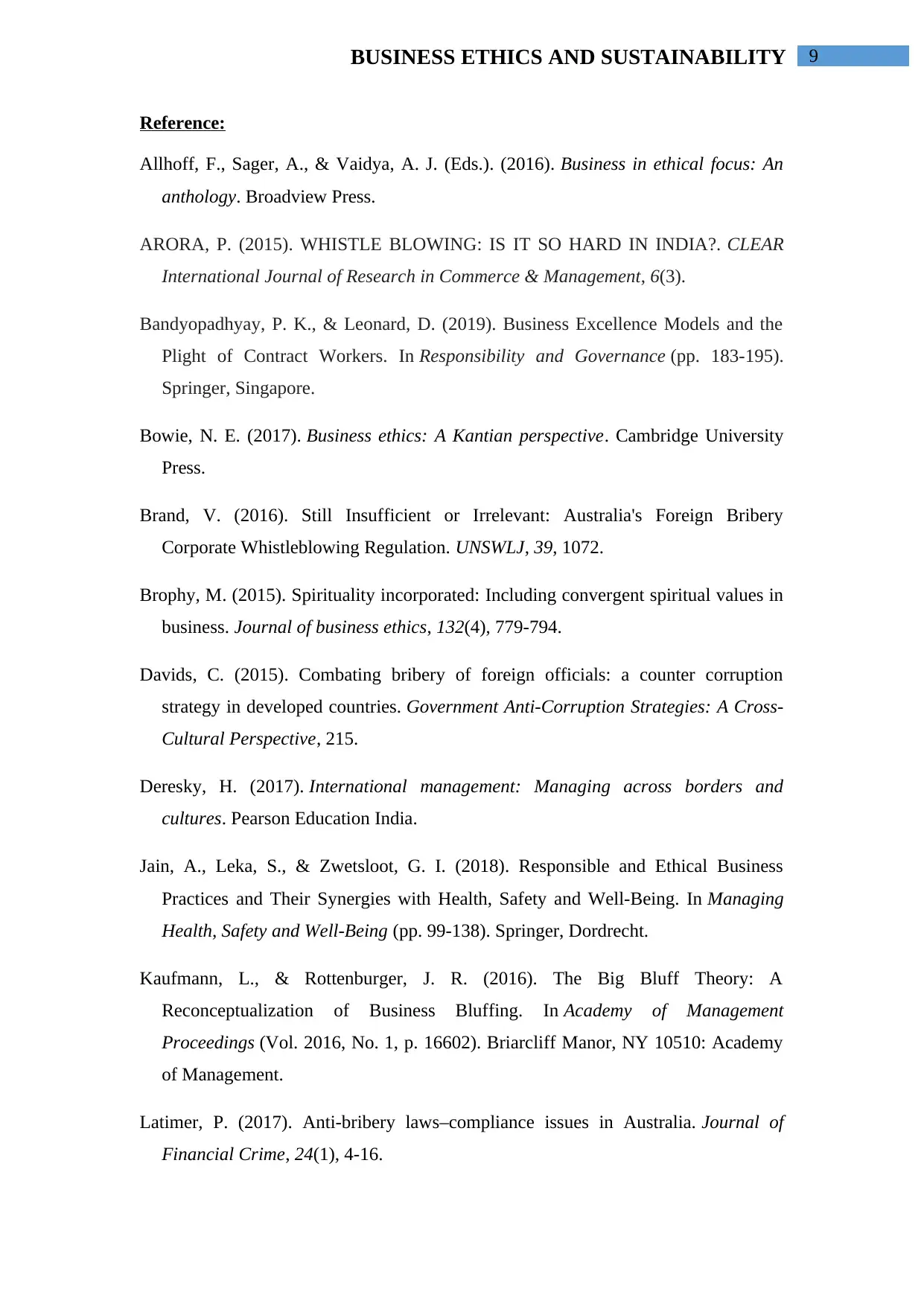
9BUSINESS ETHICS AND SUSTAINABILITY
Reference:
Allhoff, F., Sager, A., & Vaidya, A. J. (Eds.). (2016). Business in ethical focus: An
anthology. Broadview Press.
ARORA, P. (2015). WHISTLE BLOWING: IS IT SO HARD IN INDIA?. CLEAR
International Journal of Research in Commerce & Management, 6(3).
Bandyopadhyay, P. K., & Leonard, D. (2019). Business Excellence Models and the
Plight of Contract Workers. In Responsibility and Governance (pp. 183-195).
Springer, Singapore.
Bowie, N. E. (2017). Business ethics: A Kantian perspective. Cambridge University
Press.
Brand, V. (2016). Still Insufficient or Irrelevant: Australia's Foreign Bribery
Corporate Whistleblowing Regulation. UNSWLJ, 39, 1072.
Brophy, M. (2015). Spirituality incorporated: Including convergent spiritual values in
business. Journal of business ethics, 132(4), 779-794.
Davids, C. (2015). Combating bribery of foreign officials: a counter corruption
strategy in developed countries. Government Anti-Corruption Strategies: A Cross-
Cultural Perspective, 215.
Deresky, H. (2017). International management: Managing across borders and
cultures. Pearson Education India.
Jain, A., Leka, S., & Zwetsloot, G. I. (2018). Responsible and Ethical Business
Practices and Their Synergies with Health, Safety and Well-Being. In Managing
Health, Safety and Well-Being (pp. 99-138). Springer, Dordrecht.
Kaufmann, L., & Rottenburger, J. R. (2016). The Big Bluff Theory: A
Reconceptualization of Business Bluffing. In Academy of Management
Proceedings (Vol. 2016, No. 1, p. 16602). Briarcliff Manor, NY 10510: Academy
of Management.
Latimer, P. (2017). Anti-bribery laws–compliance issues in Australia. Journal of
Financial Crime, 24(1), 4-16.
Reference:
Allhoff, F., Sager, A., & Vaidya, A. J. (Eds.). (2016). Business in ethical focus: An
anthology. Broadview Press.
ARORA, P. (2015). WHISTLE BLOWING: IS IT SO HARD IN INDIA?. CLEAR
International Journal of Research in Commerce & Management, 6(3).
Bandyopadhyay, P. K., & Leonard, D. (2019). Business Excellence Models and the
Plight of Contract Workers. In Responsibility and Governance (pp. 183-195).
Springer, Singapore.
Bowie, N. E. (2017). Business ethics: A Kantian perspective. Cambridge University
Press.
Brand, V. (2016). Still Insufficient or Irrelevant: Australia's Foreign Bribery
Corporate Whistleblowing Regulation. UNSWLJ, 39, 1072.
Brophy, M. (2015). Spirituality incorporated: Including convergent spiritual values in
business. Journal of business ethics, 132(4), 779-794.
Davids, C. (2015). Combating bribery of foreign officials: a counter corruption
strategy in developed countries. Government Anti-Corruption Strategies: A Cross-
Cultural Perspective, 215.
Deresky, H. (2017). International management: Managing across borders and
cultures. Pearson Education India.
Jain, A., Leka, S., & Zwetsloot, G. I. (2018). Responsible and Ethical Business
Practices and Their Synergies with Health, Safety and Well-Being. In Managing
Health, Safety and Well-Being (pp. 99-138). Springer, Dordrecht.
Kaufmann, L., & Rottenburger, J. R. (2016). The Big Bluff Theory: A
Reconceptualization of Business Bluffing. In Academy of Management
Proceedings (Vol. 2016, No. 1, p. 16602). Briarcliff Manor, NY 10510: Academy
of Management.
Latimer, P. (2017). Anti-bribery laws–compliance issues in Australia. Journal of
Financial Crime, 24(1), 4-16.
⊘ This is a preview!⊘
Do you want full access?
Subscribe today to unlock all pages.

Trusted by 1+ million students worldwide
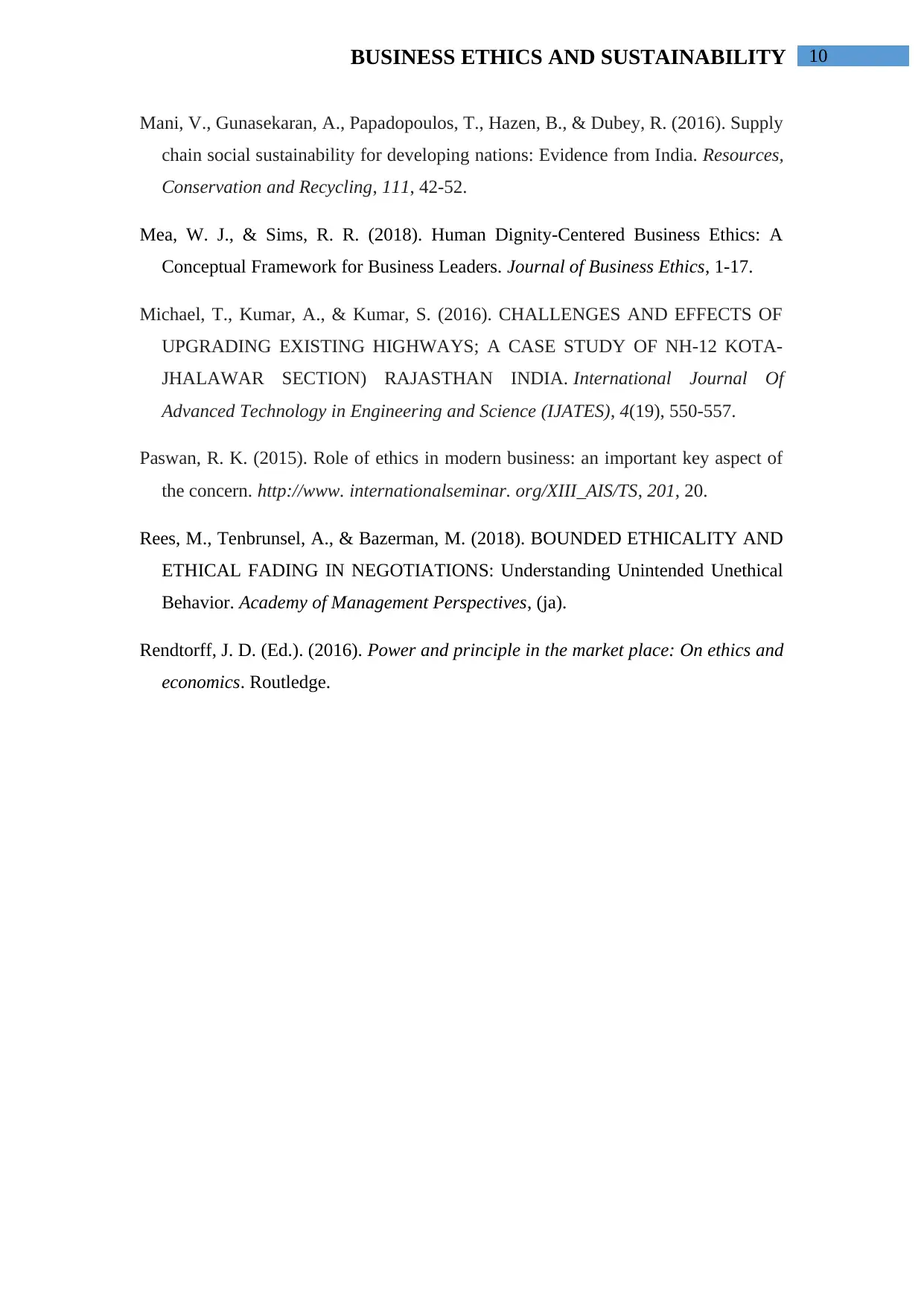
10BUSINESS ETHICS AND SUSTAINABILITY
Mani, V., Gunasekaran, A., Papadopoulos, T., Hazen, B., & Dubey, R. (2016). Supply
chain social sustainability for developing nations: Evidence from India. Resources,
Conservation and Recycling, 111, 42-52.
Mea, W. J., & Sims, R. R. (2018). Human Dignity-Centered Business Ethics: A
Conceptual Framework for Business Leaders. Journal of Business Ethics, 1-17.
Michael, T., Kumar, A., & Kumar, S. (2016). CHALLENGES AND EFFECTS OF
UPGRADING EXISTING HIGHWAYS; A CASE STUDY OF NH-12 KOTA-
JHALAWAR SECTION) RAJASTHAN INDIA. International Journal Of
Advanced Technology in Engineering and Science (IJATES), 4(19), 550-557.
Paswan, R. K. (2015). Role of ethics in modern business: an important key aspect of
the concern. http://www. internationalseminar. org/XIII_AIS/TS, 201, 20.
Rees, M., Tenbrunsel, A., & Bazerman, M. (2018). BOUNDED ETHICALITY AND
ETHICAL FADING IN NEGOTIATIONS: Understanding Unintended Unethical
Behavior. Academy of Management Perspectives, (ja).
Rendtorff, J. D. (Ed.). (2016). Power and principle in the market place: On ethics and
economics. Routledge.
Mani, V., Gunasekaran, A., Papadopoulos, T., Hazen, B., & Dubey, R. (2016). Supply
chain social sustainability for developing nations: Evidence from India. Resources,
Conservation and Recycling, 111, 42-52.
Mea, W. J., & Sims, R. R. (2018). Human Dignity-Centered Business Ethics: A
Conceptual Framework for Business Leaders. Journal of Business Ethics, 1-17.
Michael, T., Kumar, A., & Kumar, S. (2016). CHALLENGES AND EFFECTS OF
UPGRADING EXISTING HIGHWAYS; A CASE STUDY OF NH-12 KOTA-
JHALAWAR SECTION) RAJASTHAN INDIA. International Journal Of
Advanced Technology in Engineering and Science (IJATES), 4(19), 550-557.
Paswan, R. K. (2015). Role of ethics in modern business: an important key aspect of
the concern. http://www. internationalseminar. org/XIII_AIS/TS, 201, 20.
Rees, M., Tenbrunsel, A., & Bazerman, M. (2018). BOUNDED ETHICALITY AND
ETHICAL FADING IN NEGOTIATIONS: Understanding Unintended Unethical
Behavior. Academy of Management Perspectives, (ja).
Rendtorff, J. D. (Ed.). (2016). Power and principle in the market place: On ethics and
economics. Routledge.
1 out of 10
Related Documents
Your All-in-One AI-Powered Toolkit for Academic Success.
+13062052269
info@desklib.com
Available 24*7 on WhatsApp / Email
![[object Object]](/_next/static/media/star-bottom.7253800d.svg)
Unlock your academic potential
Copyright © 2020–2025 A2Z Services. All Rights Reserved. Developed and managed by ZUCOL.





